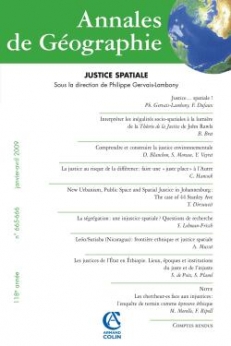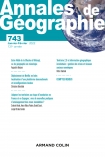
Annales de Géographie n° 665-666 (1-2/2009)
Pour acheter ce numéro, contactez-nous
Recevez les numéros de l'année en cours et accédez à l'intégralité des articles en ligne.
Cet article tente de montrer en quoi les efforts pour acclimater en France des théories de la justice telle que celle d’I.M. Young rencontrent des réticences spécifiques, liées au statut de la « différence », qui diverge dans notre société et dans les pays anglophones. Mettant en parallèle particulièrement le cas britannique et le cas français, il illustre, par le biais des débats autour des « statistiques ethniques » et du « foulard islamique », comment la question de la « juste place » accordée à l’Autre (minorités « ethniques » ou religieuses) se pose différemment de part et d’autre de la Manche.
Drawing on I.M. Young’s conceptualisation of justice, this paper addresses the different ways in which France and Anglophone countries (Britain in particular) have dealt with minority groups, with particular reference to Muslim minorities. The « headscarf affair » which developed in France, and the legal framework to which it gave rise, are analysed in spatial terms, with emphasis on the very specific part attributed to the space of public schools. France’s traditional refusal to acknowledge « ethnic » difference or to incorporate it into national statistics is discussed, as are the implications of racial discrimination being seen as incidental, and not as a form of institutional, « systemic » violence: the geographies of racial discrimination remain piecemeal and we are deprived of the means to describe them more generally. British multiculturalism was shaken by the aftermath of the July 2005 bombings in London but a couple of conflicts which arose in 2006 about a pupil or an instructor wearing the niqab (or full veil) in school failed to escalate to a full-blown crisis, as local and flexible responses were found to be more adequate than a nation-wide policy. Finally, both ways of addressing difference may be edging closer together, but still differ widely.

